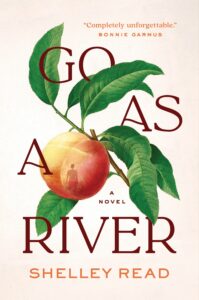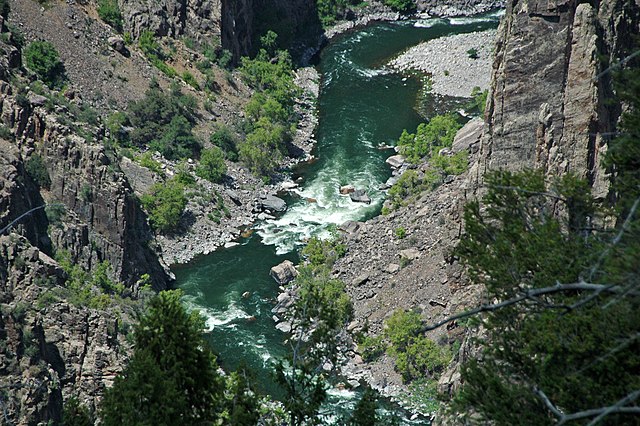
Love is sacrifice, sacred land life-affirming (Gunnison River Valley, Colorado; 1948—1970): Crying can soothe us. All the more reason to let Shelley Read take you on this absolutely beautiful and sad journey.
“There is a kind of sadness that transcends sadness, that runs like hot syrup into every crevice of your being . . . This is the sadness that changed everything.”
Sadness is the pathos, beauty the richness in Read’s standout historical novel Go as a River. Influenced by the teachings of two Buddhist monks, who inspired “her best life” and now she inspires ours.
The title is directly drawn from one of legendary Vietnamese mindfulness master and peace activist Thích Nhất Hạnh’s poetic quotes, calligraphy, and the calming song based on it. Its meaning from his spiritual The Story of a River: “Who speaks of a river as not flowing? A river does flow, yes. But she does not need to rush.” To embrace the beauty of life, love, the natural world you must also go through life’s adversities.
Tibetan monk Anam Thubten’s books hold titles that reflect themes that flow through the novel: Kindness for All Creatures, Choosing Compassion, Big Sky.
Earthbound and wilderness bound, there’s unforgettable scenes of selfless, unflinching, compassionate acts involving forbidden love and a beloved horse. Set in a place of stunning natural beauty, the big blue skies of Colorado in the Big Blue Wilderness, an “indescribable immensity,” flows through a terribly lonely, grieving, “blossoming” woman showing her she may not be as alone as she thought.
This rugged landscape is in America’s Southwest. “A little nowhere Colorado town” in the Gunnison River Valley where Read has lived her entire life. She knows the forces of Nature here, just as she knows its beauty even after unspeakable losses. Read waited thirty years to craft this awesome novel, after teaching creative writing, literature, and environmental studies.
Iola was the name of the town. Was because the hands of man drowned the town, mirroring the young narrator Victoria’s tragic losses at the hands of one man. Whether the wilderness has the power to give her the strength she needs to save herself is the central question. Can she save herself?
Historically, Iola was erased in the late 1960s to create the Blue Mesa Dam and Reservoir to bring more water down from the mountains. The sadness Victoria endures aligns with the sadness of seeing her town disappear. Can you “hold onto something of this earth you care deeply about” to survive?
How’s this for the opening sentence of a prologue? “Imagine what lingers on the black bottom of a lake.” Followed by: “My home is at the bottom of a lake.” Decades later, due to severe drought, haunting remnants of the town have begun to emerge. Nature proving more powerful than man, symbolic to Read’s story.
Iola was “huddled against the foothills of the Big Blue wilderness on the south side and the towering Elk Mountains to the west and north” in 1948 when the story begins. This is the area where Read lives too, on what’s known as the Western Slope of the Elk Mountains. West of the Continental Divide. You’ll feel the love, blood, and soul of five generations of her Colorado ancestors embedded in the soulful prose and storyline.

by James St. John [CC BY 2.0] via Wikimedia Commons
Seventeen-year-old Torie begins her story, later shifting to her rightful name, Victoria, when she becomes a woman. She refers to herself as “patternless” because: “All on my own I figured out how to carry on without a mother.” At age twelve, her mother dies in an accident along with two relatives she was close to who also lived at their farmhouse. Forced to fend for herself when she’s left to live with three angry men who treat her like a “mere fixture,” expected to carry on her mother’s farm duties, cooking and toiling for a disengaged father, younger brother Seth, and the shell of an uncle post-WWII.
They’re second and third generation farmers, except for Seth no one ever knows where he is. They own an unlikely peach orchard – sweet and juicy seeds unearthed from Georgia – that Torie/Victoria says is the “one beautiful thing” in her life.
Early on, the reader is clued into “a fateful moment, I know in retrospect.” Several pages later warned: “It is often the smallest twist that alters our lives most profoundly.”
Swiftly moving, on line one of Chapter One Torie meets Wilson Moon walking on the opposite side of the street she is. When they lock eyes, they feel a deep attraction to each other. They end up walking together, not easy for a girl drilled on “proper” behavior. A small act of defiance against her no-nonsense/strict/religious mother’s rules that intensify when she hears Wil called a “filthy Injun.” Overwhelmed by the “bigotry,” the “cruelty of ignorance” towards the one person who gave her freedom “for the first time in her life.” He never said who he was, his tribe or reservation, nor why he wandered into the town. Her father initially thought he was Mexican. Being an American Indian, a far worse crime.
So much happens in this layered-upon-layered story in the telling that would be spoilers, but telling you he’s from the Ute tribe is telling Colorado history.
The young couple’s love-at-first-sight relationship leads to Torie wondering: “How does one live seventeen years without ever considering whether she is known”? A question that hangs heavy given the alarming loneliness crisis teenagers are experiencing in America. One in six, according to Newsweek, struggling with suicidal ideation. So what happens to Torie when faced with unbearable aloneness?
The will to live is mystifying. The “eternal cadence” of the wilderness and the “wonder of the world” are entry points. There’s so many passages of exquisite nature writing, such as witnessing “the total silence of a trotting fox, the perfect symmetry of a beaver lodge, how butterflies arrived like a toss of colorful confetti.” Understanding Nature as an “ancient intelligence far too rich and complex to fully grasp,” Read’s gift is imparting what’s she’s learned living in a spirited land.
As for the crying, you may find tears welling up in your eyes for at least the last 100 hundred pages. Until the last fifty, when they overflow. Until the last twenty, when you’re on the verge of sobbing.
A movie deal is in the works. When it makes it to the screen, keep tissues nearby. Although one wonders if anything can beat the prose.
Lorraine